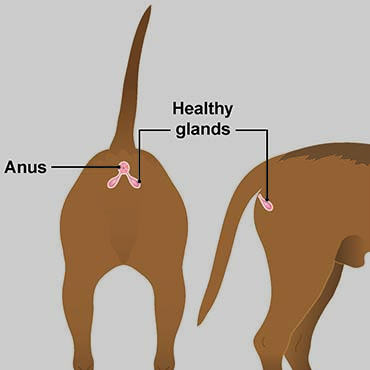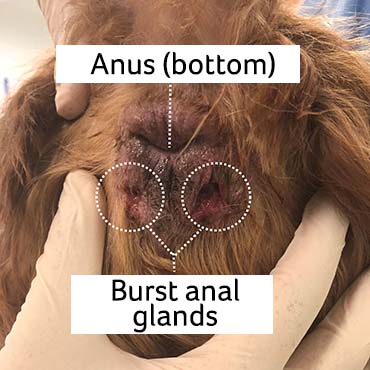Anal gland abscesses in dogs
Overview
- The anal glands are a pair of small sacs that sit just inside the anus (bottom). They contain a strong-smelling liquid used for marking territory.
- The anal glands should empty during toileting, but if this doesn't happen, blockages and abscesses can develop.
- Anal gland abscesses are extremely painful and can burst if they aren't treated quickly.
- Contact your vet ASAP if you think your dog has an anal gland abscess.
- Never try to treat an anal gland abscess yourself; you could cause serious damage and pain.

The anal glands are a pair of small sacs that sit just inside the anus. Click image to enlarge.
Symptoms
Symptoms of an anal gland abscess include:
- A red, swollen bottom
- Scooting (dragging their bottom along the ground)
- Pain pooing
- Nibbling and licking the anus and/or lower back
- A foul, fishy smell
- A wound near their bottom
- Sitting down suddenly
- Discharge, blood or matting around their bottom
- Eating less
- Low energy (lethargy).

Both of this dog’s anal glands have burst because of abscesses.
Burst anal gland treatment
Unlike blocked anal glands, anal gland abscesses are often too painful for your vet to empty straight away. Instead, your dog may be given anti-inflammatories to help with the pain, and a short course of antibiotics to help clear the infection. However, if your dog’s abscess has already burst, it’s likely to be much less painful and the pus inside the abscess will be draining by itself, meaning your dog is unlikely to need antibiotics.
Keep it clean. Your vet will clip and clean your dogs bottom so that you can keep it clean at home. Use warm salty water and cotton wool pads to clean your dog twice daily and after they poo. Your dog will need to wear a buster collar (protective head cone) until they have fully recovered. Do not allow them to lick their bottom, the bacteria inside their mouth will make the problem much worse.
Ongoing problems
Swabs. If the abscess doesn’t go away, or comes back after treatment, your vet may decide to swab the abscess to determine which antibiotic is best for your dog.
Flushing. If your dog’s glands are too difficult or painful to empty despite medication, your vet may recommend flushing them under anaesthetic.
Surgery. If the problem keeps returning, surgery to remove the anal gland(s) may be recommended, however this is usually a last resort because surgery around the anus has a high risk of infection and complications.
Outlook
Most anal gland abscesses heal within a week of receiving treatment from a vet as long as they are kept clean and there are no complications. If your dog has ongoing problems with their anal glands your vet may advise regular check ups/anal gland emptying and adding extra fibre to your dogs diet.
Prevention
Keep your dog slim. Overweight dogs often find it harder to empty their anal glands because they have weak muscles around their bottom. Keep your dog at a healthy weight and feed them a good quality complete dog food.
Regular checks. If your dog suffers with ongoing anal gland problems, they may need regular vet/vet nurse check-ups. You will quickly become an expert at spotting the signs of a problem starting.
Fibre. If your dog suffers with regular problems, add some fibre to their diet to bulk out their poo. A firmer/bulkier poo will press harder on the anal glands when toileting, which helps to empty them.
Sugar free bran flakes or bran powder is often the best way to add fibre to your dog’s diet. Speak to your vet for more information.
Cost
It’s impossible to give exact pricings for anal gland abcess treatment because each vet clinic varies, and cost depends on treatment needed. Always speak to your vet if you can’t afford the treatment they have recommended, there may be another option.
Consider taking out dog insurance as soon as you bring your dog home, before any signs of illness start. This will give you peace of mind that you have some financial support if they ever become unwell.
Published: June 2020
Did you find this page useful?
Tell us more
Please note, our vets and nurses are unable to respond to questions via this form. If you are concerned about your pet’s health, please contact your vet directly.
Thank you for your feedback
Want to hear more about PDSA and get pet care tips from our vet experts?
Sign up to our e-newsletter
Written by vets and vet nurses. This advice is for UK pets only. Illustrations by Samantha Elmhurst.

 Video found at youtu.be/JzA8VzAET18
Video found at youtu.be/JzA8VzAET18
